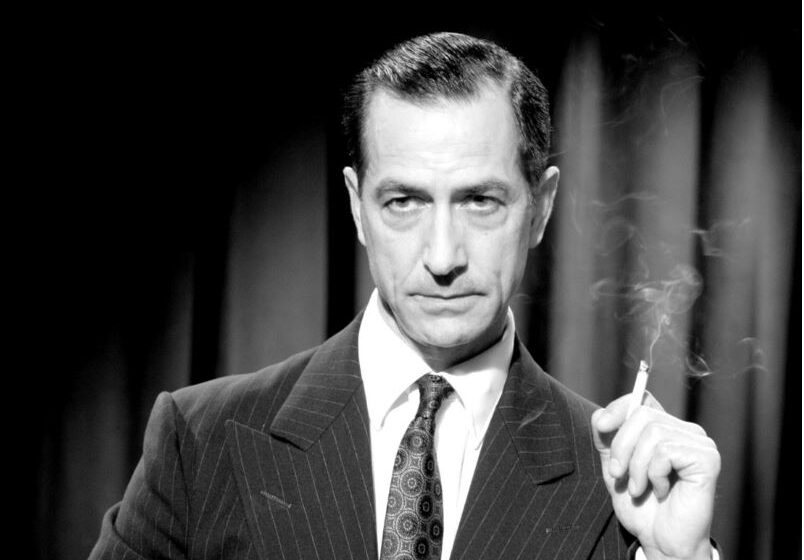Appalchian State University
Mr. Childress
RC-2001
9/2/2022
The Whole Struggle is Lost
Edward R. Murrow chose the 1958 Radio Television Digital News Association (RTDNA) convention as the venue for his speech critical of the media, portrayed in the movie, Good Night and Good Luck. The decision had some benefits but suffered serious drawbacks to the effectiveness of his presentation. A benefit was he might have had difficulty finding another occasion when so many influential people in the media industry were present. But alternatively, the attendees were convention-goers, there mostly to enjoy themselves and mingle, celebrate, and present awards to each other.
At the time of this speech, Murrow was a nationally respected broadcaster, closely associated with CBS – a man who needed no introduction, and everyone in attendance assumed him to be more knowledgeable than most on the topic of television and mass media. But his central argument, to take a hard look at the system of program financing – how it shapes the content of the medium TV, and how that affects viewers and society – was not directed to an impartial audience. The speech was critical of an advertiser-financed broadcasting structure, a system supported by commercialization that had already become entrenched, and everyone in attendance was profiting from it.
Murrow’s introduction set out to achieve several purposes: in one short line he got everyone’s attention, added a slight bit of humor from a man not known for humor, and encapsulated what could possibly be concluded by listeners at the end of his speech: “This might not do anybody any good.” (Eidenmuller)
His very next sentence assured his audience that what was to come was in no way self-serving, that one “could accuse this reporter of fouling his own comfortable nest.” He then alerted them that his speech would present ideas that could be seen as objectionable, even “heretical” to the RTDNA media organization. But finally, he assured them that the status quo would not likely suffer – their jobs were safe.
This setup in one compact paragraph efficiently cleared the way for his audience to hear him out. He proceeded to illustrate that if one were to look at the current output of media objectively at some future date they would find “evidence of decadence, escapism, and insulation from the realities of the world in which we live.”
This is almost certainly not how the audience saw their own work or participation in mass media. But he then added a line that many could likely see, if not in themselves then maybe in others seated around them: “We are currently wealthy, fat, comfortable, and complacent.” Few could have argued with this assessment. TV was new, but it was growing exponentially, affording well-paid positions to run it – especially those of executives. It afforded the lavish convention they were attending.
Murrow proceeded to highlight how the structure of sponsor-funded programming shaped the media landscape and available programs. He asked if an evening entertainment show were instead devoted to an informative news program, “Would the corporate image of their respective sponsors be damaged?”
Advertisers understood early in television broadcasting that when ads aired could be more important than the content of the ad. The programming directly before and after a commercial tied products to the program and created good, bad or neutral associations. So, it wasn’t enough to simply air to the most people, the associated programing was important too, and sponsors had considerable influence with TV executives to determine what was aired around their commercials under the threat of pulling advertising revenue.
This created a climate where “We have a built-in allergy to unpleasant or disturbing information.” He urged his audience to recognize that television was being used to “distract, delude, amuse, and insulate us.” Murrow’s view was clearly that society would benefit from the inclusion of more serious, informational programming and that “a few million people would have received a little illumination on subjects that may well determine the future of this country.”
He predicted a rebuttal from the media industry, that the public wasn’t interested in much beyond entertainment, that even if presented with informative programing people wouldn’t watch it. Murrow disagreed, saying there is “considerable evidence against that contention.”
His argument shined a light on a profound social phenomenon underway, but the warning fell on deaf ears, to a group whose self-worth and salary were preserved by ignoring him. “If they are right, if this instrument is good for nothing but to entertain, amuse and insulate, then the tube is flickering now and we will soon see that the whole struggle is lost.”
This has unfortunately come to pass. As technology advanced and TV sets replaced the fireplace and radio as the hearth of a home and medium of choice, ever more research refined the art of advertising to the colossus it is today. Advertising has become so integral to the function of society, and so pervasive in all forms of modern mass media that Americans have long been accustomed to TV programs, video games, etc., being interrupted at any moment with a sales pitch, one quarter of every hour on TV.
Works Cited
Eidenmuller, Michael E. American Rhetoric: Good Night and Good Luck – E.R. Murrow Addresses the Radio-Television News Directors Association, https://www.americanrhetoric.com/MovieSpeeches/moviespeechgoodnightandgoodluckmurrow.html.
